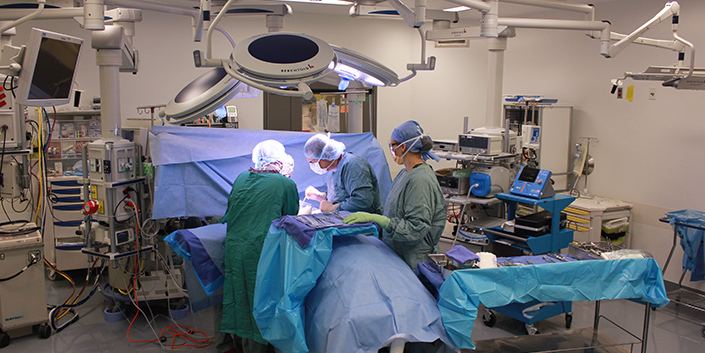Huge gains made in breast cancer treatment at the MUHC
Montreal – A new technology known as Intrabeam®, that provides intraoperative radiation therapy, is showing promising results in the treatment of breast cancer patients with low-risk recurrence at the Cedars Cancer Centre of the McGill University Health Centre (MUHC). The state-of-the-art device, which is being used as part of an ongoing clinical trial at the MUHC, is used to administer a single dose of concentrated radiotherapy from inside the breast during tumour-removal surgery, eliminating the need for post-surgery radiotherapy and reducing healthcare costs.

Carried out during surgery, directly after the lumpectomy, the wand-like Intrabeam® device, which is the first of its kind in Quebec, provides localized doses of targeted radiation that destroy any remaining tumor cells while causing minimal damage the surrounding healthy tissue or organs.
“The vast majority of local breast cancers recur within the primary tumour site. As such, a device like Intrabeam®, which focuses treatment in this area of the tumour at the same time it is surgically removed is a potentially effective strategy at reducing recurrence,” explains Dr. Sarkis Meterissian, Director of the Cedars Breast Clinic of the MUHC. “As far as clinical trials go, the results collected to date have been outstanding, both in terms of patient outcomes and cost savings to the healthcare system.”
This one-time 30 minute treatment eliminates the need for as many as four to six weeks (or 20 to 30 visits) of external radiation therapy post-surgery, freeing patients from additional exposure and stress. Eliminating the need for follow-up radiation therapy also significantly reduces costs to the healthcare system by approximately $ 1,000 per patient.
Janet Pegg, 69, who underwent treatment in March 2015, was eager to participate in the trial. “Getting to my medical appointments has been hard enough, let alone having to come back for at least 20 daily treatments after the surgery,” explained Ms. Pegg, who is a full-time care-giver for her adult handicapped daughter. “When they told me I qualified for a new type of one-time treatment instead, it sounded too good to be true.” Since the surgery, Ms. Pegg has had three follow-up visits at the Cedars Cancer Centre, and has remained cancer free since. “It has made the world of difference, not just for me, but for my daughter as well,” she said.
While this treatment option is currently only available as part of an ongoing clinical trial, oncology experts at the MUHC are optimistic that Intrabeam® will soon be more widely available. “So far the data are remarkable,” states Dr. Tarek Hijal, Director of the Division of Radiaton Oncology at the MUHC. “Since 2013, 21 women have received Intrabeam® treatment as part of this MUHC clinical trial, each of them with positive patient satisfaction and few side effects.”
"New developments in advanced medical care come from an interdisciplinary approach to medicine where professionals and scientists with different complementary expertise collaborate and bring a new treatment technique to life,” explains Dr. Jan Seuntjens, Director of Medical Physics at the MUHC. “In this particular case, surgeons, radiation oncologists, and medical physicists have worked together to make this treatment benefit our patients.”
Special recognition is made to the Montreal General Hospital (MGH) Foundation, who bore the capital cost of the equipment in partnership with a generous donation by the Jarislowsky Foundation.
-30-
About the McGill University Health Centre (MUHC)
One of the world’s foremost academic health centres, the MUHC offers exceptional and integrated patient-centric care, research, teaching and technology assessment. Affiliated with the Faculty of Medicine of McGill University and part of the RUIS-McGill, the MUHC has a mandate to focus on complex care and is highly committed to working with partner organizations to ensure continuum of care in its community. The partner hospitals of the MUHC—the Lachine Hospital, the Montreal Chest Institute, the Montreal General Hospital, the Montreal Neurological Hospital, the Royal Victoria Hospital and the Montreal Children's Hospital—value multidisciplinary service throughout the lifespan, innovative technologies and practices, strategic partnerships and leadership in knowledge transfer. The MUHC is currently carrying out a $2.355-billion Redevelopment Project on three sites - the Glen, the Montreal General and Lachine hospitals. The project will support environments that ensure patients and their families receive the best care possible, now and for many generations to come. The sites are also anchored in best sustainable-development practices, including LEED® and BOMA BESt guidelines.
Contact:
Public Affairs and Strategic Planning
McGill University Health Centre
e: [email protected]
t: 514-934-1934 ext. 31560
